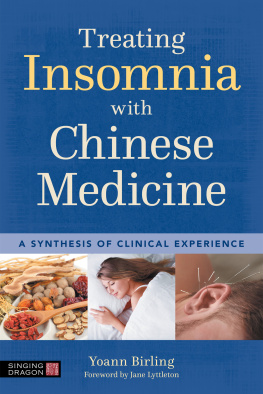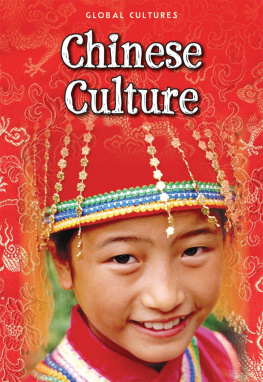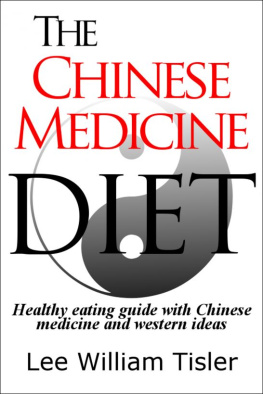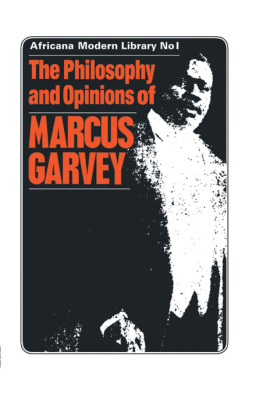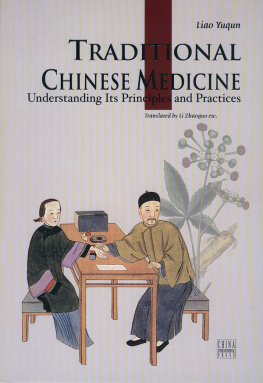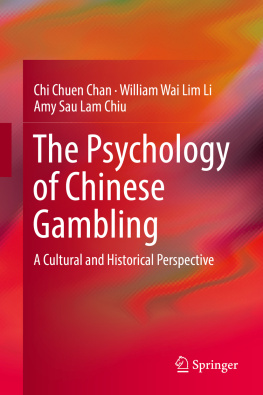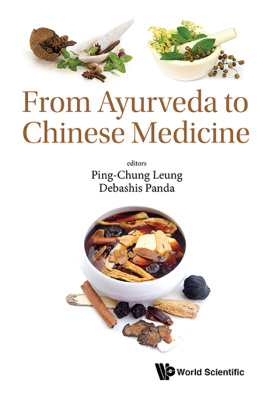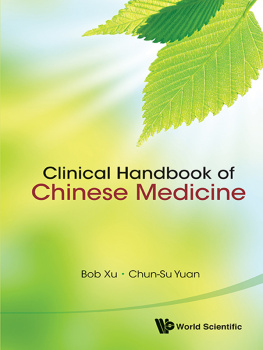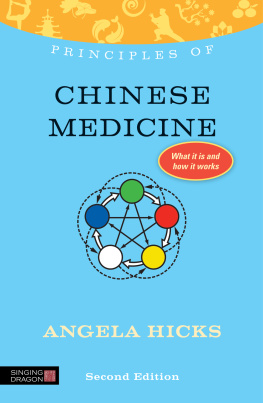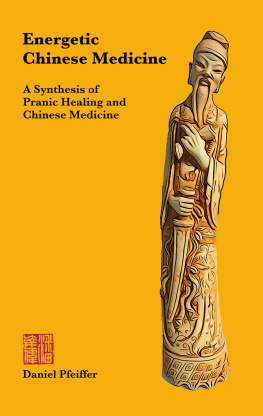Mary Garvey - Chinese Medicine Psychology
Here you can read online Mary Garvey - Chinese Medicine Psychology full text of the book (entire story) in english for free. Download pdf and epub, get meaning, cover and reviews about this ebook. year: 2020, publisher: Jessica Kingsley Publishers, genre: Religion. Description of the work, (preface) as well as reviews are available. Best literature library LitArk.com created for fans of good reading and offers a wide selection of genres:
Romance novel
Science fiction
Adventure
Detective
Science
History
Home and family
Prose
Art
Politics
Computer
Non-fiction
Religion
Business
Children
Humor
Choose a favorite category and find really read worthwhile books. Enjoy immersion in the world of imagination, feel the emotions of the characters or learn something new for yourself, make an fascinating discovery.
- Book:Chinese Medicine Psychology
- Author:
- Publisher:Jessica Kingsley Publishers
- Genre:
- Year:2020
- Rating:3 / 5
- Favourites:Add to favourites
- Your mark:
- 60
- 1
- 2
- 3
- 4
- 5
Chinese Medicine Psychology: summary, description and annotation
We offer to read an annotation, description, summary or preface (depends on what the author of the book "Chinese Medicine Psychology" wrote himself). If you haven't found the necessary information about the book — write in the comments, we will try to find it.
Chinese Medicine Psychology — read online for free the complete book (whole text) full work
Below is the text of the book, divided by pages. System saving the place of the last page read, allows you to conveniently read the book "Chinese Medicine Psychology" online for free, without having to search again every time where you left off. Put a bookmark, and you can go to the page where you finished reading at any time.
Font size:
Interval:
Bookmark:

Chinese Medicine
PSYCHOLOGY
A Clinical Guide to Mental
and Emotional Wellness
PROFESSOR QU LIFANG ()
and DOCTOR MARY GARVEY ()
with Doctor Li Weihong ()

Contents
Preface
Chinese medicine is uniquely equipped to assist in the management of mental and emotion-related illnesses, and Chinese medicine psychology is a growing area of clinical practice in China and the West. This book is a professional, clinical practice and learning resource designed to facilitate and promote this important field of healthcare. It provides an introduction and clinical guide for practitioners and students, healthcare professionals and users.
The content is based on both recent and ancient Chinese language, culture and medicine sources. Its theory and practice sections begin with the early medical classics that have guided Chinese medicine practice throughout its history. The discussion applies classical data to the contemporary clinical setting, modern disease categories and individual patient presentations, making these valuable classical resources accessible and relevant for mental health care and illness management today.
is a guide to clinical practice based on classical Chinese medicine treatment strategies and formulas, especially those of the Essential Prescriptions of the Golden Cabinet ( c. 220 CE ). While these topics will be of interest to many outside the Chinese medicine profession, the authors advise that readers wishing to try Chinese medicine therapies should seek the advice of qualified Chinese medicine practitioners.
The principle authors are experienced Chinese medicine clinicians, researchers and academics. Professor Qu Lifang was the Director of the Golden Cabinet Department at the Shanghai University of Traditional Chinese Medicine until her retirement in 2016. She is a highly sought-after international lecturer who has designed and conducted Chinese medicine courses at the universities of East Finland, Hamburg, Hong Kong, Malta and Sydney, and the international medical university of Malaysia, and training courses in Thailand. Doctor Mary Garvey is a senior lecturer in the Chinese medicine programs at the University of Technology Sydney. Together, Professor Qu and Doctor Garvey have 70 years of clinical, teaching and research experience in the field, and 20 years of co-authored internationally published work. Both are members of the World Federation of Chinese Medicine Societies Mental Diseases Specialty Committee (Beijing, established 2013).
We gratefully acknowledge the generous assistance and expertise of Doctor Li Weihong, lecturer, clinician and researcher in Chinese medicine at the University of Technology Sydney, who has translated most of the case studies from Professor Qus psychology textbook (Qu 2015).
Qu Lifang () and Mary Garvey ()
April 2019
PART 1
INTRODUCTION
AND BASIC
THEORY
In China and the West, clinical evidence is growing for Chinese medicines effectiveness in assisting the management of many illnesses, including mental and emotional conditions. This book presents an introduction to Chinese medicine psychology and a clinical guide for practitioners.
In ), we draw some parallels between Chinese medicine psychology and psychology in the West.
applies Chinese medicine theories to the diagnosis and treatment of common psychological illnesses. There are so many psychological categories and diseases that we concentrate on early illness categories and contemporary disease conditions that are common in our clinics today. The discussion presents diagnostic information and treatment strategies that practitioners can readily apply to their patients. It is structured so that we can extend and modify these tools and strategies to interpret and manage a great many mental, emotional, mood and personality disorders, and individualize treatments for specific presentations. The cases in the final chapter help illustrate the application of Chinese medicine theory and practice to the care and management of psychological disorders.
Chinese medicine and Western medicine tend to observe and investigate human life from different perspectives. Generally speaking, for example, Chinese medicine does not separate a persons illness experiences into psychological or physical categories. Even so, the Chinese medicine classics contain a great deal of information on what we nowadays call psychology. Their many references to human mentality reveal detailed perspectives that remain relevant for practice in the present day.
Its historical records show that Chinese medicine investigated and described human life from ancient times. It saw the living body as a cosmos, combining cognitive ingredients, social ideals, physical data, and sensual self-awareness (Lloyd and Sivin 2002, p.218). Classical doctrines that describe early perspectives form the general principles for Traditional Chinese Medicine (TCM) theory and practice today. TCMs general principles and basic theories apply to all areas of clinical practice, and our presentation of them in emphasizes those aspects most relevant for the understanding, diagnosis and treatment of psychological diseases. The relationships and dynamics of the living human body, its source and beginning, its organ systems and q substances, the three levels of shn -spirit/mind, the emotions and personality, are central features of TCMs approach to psychology. As a construct of the 1950s and 1960s, TCM is the current Chinese medicine orthodoxy. In this book, TCM therefore refers to modern Chinese medicine, and Chinese medicine to the whole of Chinese medicine, including its classic texts and historical currents.
In philosophy and medicine, the Chinese notion of q (function, influence, very fine substance) bridges the accepted distinctions between matter and energy, body and mind. According to ancient cosmology, all phenomena throughout the universe are interrelated because they arise from a single point, the great ultimate ( ti j ), and share this one source.
Thus, from at least the time of the Zhung Z (late 4th century BCE ), Chinese philosophy emphasized the idea of the one q running through heaven and earth, through all immaterial and material, insubstantial and substantial things. Consequently, the concept of q embraces the inter-convertibility of matter and energy, and therefore, in Chinese medicine the body and mind are not just closely linked. Similarly, and while signaling the psychological aspects of human life, the term shn (spirit/mind) also challenges the idea that the body and mind are separate entities.
Chinese medicines earliest classic text is the Yellow Emperors Inner Canon .
In the Inner Canon , the body form and spirit/mind ( xng shn ) concept is built on the functioning inter-relatedness of material and energetic resources. The shn -spirit/mind depends on the living body for its existence. The body provides its dwelling place, and the bodys transformation and movement of q , blood and essence supply the material basis for shn q activities and influences. The shn for its part guides the bodys q movements, transformations and materializations. The shn s directing influences shape the body form, its physiological process-events, its active ( yng ) and structured ( y n ) states. As well as guiding our physical and physiological features, the shn is the principle force that conditions our character and personality.
Every human life has attributes and abilities derived from many generations of human evolution, and depending on our inherited allotment, each has certain potentials and resources for developing those abilities. The interactions between inherited and acquired resources have far-reaching implications for our physical, mental, emotional and psychological development. These ideas are fundamental for TCM theories of life, health and illness, and help explain the importance it places on self-cultivation to maintain physical and mental health.
Font size:
Interval:
Bookmark:
Similar books «Chinese Medicine Psychology»
Look at similar books to Chinese Medicine Psychology. We have selected literature similar in name and meaning in the hope of providing readers with more options to find new, interesting, not yet read works.
Discussion, reviews of the book Chinese Medicine Psychology and just readers' own opinions. Leave your comments, write what you think about the work, its meaning or the main characters. Specify what exactly you liked and what you didn't like, and why you think so.



